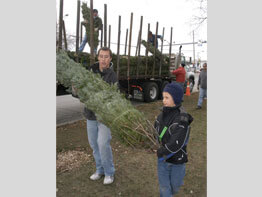OSHKOSH, Wis. – Evergreens have long been associated with the Christmas season. They offer the fresh scent of nature indoors in the midst of winter and symbolize the promise of eternal life.
For Wisconsin Christmas tree growers, the season provides not only the bulk of their livelihood, but also the chance to share their faith.
“It’s historical to have a fresh Christmas tree,” said Dick Wojcik, who co-owns Wojcik’s Christmas Tree Farm in Pulaski with his son, David. “There is nothing like the fresh odor of a new Christmas tree in our living room.”
After teaching biology for 36 years, Mr. Wojcik started planting Christmas trees in 1988 as a retirement activity.
“I’m an applied biologist now,” Mr. Wojcik told The Compass, newspaper of the Green Bay Diocese. “We think the trees are environmentally friendly, remove carbon dioxide from the air, provide resting places for birds and for other wildlife to live, and they’re recyclable. A (fake) tree bought from the store is an oil product, and that has to decompose in some landfill.”
His farm is a place where people can come and cut their own tree, or have the Wojciks do it for them. Mr. Wojcik said the parklike setting offers a fun family opportunity.
Mr. Wojcik, a member of Assumption of the Blessed Virgin Mary Parish in Pulaski, donates trees to a yearly drive for armed forces personnel in Wisconsin.
Tom Happersett, owner of Happ’s Homegrown Christmas Trees in Neshkoro, started working for a tree grower when he was 14. He grew to love the business and eventually started his own.
“I guess there’s nothing I’d rather do than grow Christmas trees,” Happersett said. “I really enjoy it. I love the outside and watching trees grow. It’s creating something. It takes anywhere from eight to 10 years to grow a tree and get it to market. And it’s very challenging. You have to shape them with a knife to get the Christmas tree shape, and it’s all hand labor. It’s kind of like life. You get what you put into it.”
Mr. Happersett sells trees wholesale in many Midwest outlets, and he has a retail spot in Orlando, Fla., where he has sold for 33 years. He donates trees to organizations such as local churches and the Salvation Army in Orlando, and also to individuals who are unable to afford a tree.
“I think it’s something (when) you’re giving back to somebody,” he said. “I feel that as long as I have the tree, I’m more than happy to donate it.”
Sister Pat Flanigan, coordinator for Hispanic ministry for the Green Bay Diocese, serves the Hispanic community in Wautoma and several counties surrounding it. She said Mr. Happersett’s tree donations to the parish and to area Hispanic families are a blessing.
“The Hispanics have a great devotion to the infant Savior, and they all celebrate this feast with a lot of enthusiasm,” said Sister Pat, a Sister of the Sorrowful Mother. “The tree is important because it’s a symbol of the time of the Nativity, a time to celebrate the birth of Jesus.”
St. Patrick Parish in Menasha runs a yearly tree sale as a fundraiser and has bought its trees for a decade from Bruce A. Niedermeier of ANR Tree Farm in Wautoma. He donates several trees and all the boughs parish volunteers can pack into their vehicles to help parishioners who can’t afford a tree.
Joyce Naps, stewardship coordinator at St. Patrick, has overseen the parish’s Christmas tree sale for the past 10 years. The sale is not about raising money as much as it is about building community, Naps said.
For people who come to look at trees but don’t think they can afford one, St. Patrick gives them one.
“It’s our way to share Christmas,” Ms. Naps said.


